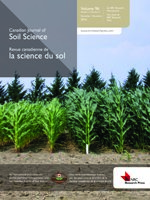Moulin, A. P., Buckley, K. E. and Volkmar, K. 2011. Soil quality as affected by amendments in pinto bean-potato rotations. Can. J. Soil Sci. 91: 533-542. The potential for adverse effects on soil quality and erosion in pinto bean-potato rotations is significant due to low levels of residue input to the soil following potatoes or beans, and the effect of tillage on soil structure, particularly in sandy-textured soils typical of the potato-growing area of Manitoba. Soil quality is reduced by low inputs of residue and carbon commensurate with an increase in the proportion of small and unstable aggregates susceptible to erosion. Furthermore N and P concentrations at the soil surface may be affected by various management options including fall cover crops, application of straw and the use of composted manure. In a study conducted at Carberry, MB, from 2000 to 2006, KCl-extractible NO3-N and Olsen P were determined in the fall prior to seeding in each year of the study. Water-soluble P, determined in the fall of 2005 for selected treatments, increased with application of compost. Soil organic C, total N and the proportion of erodible (<0.5-mm diameter) aggregates and stability of aggregates were measured in 2006 for treatments with fall-applied compost, cereal straw, and spring-applied anionic polyacrylamide (PAM). The proportion of erodible aggregates and aggregate stability were not consistently affected by treatment. Application of PAM did not affect stability of wet-sieved aggregates (1.3 to 2.0 mm), but decreased the proportion of small aggregates (<0.5 mm) in 2002. Soil C in the 0- to 5-cm depth increment increased with fall application of composted beef cattle manure. However, no effect was observed on the dry-sieved distribution of aggregates <0.5 mm in diameter. Soil quality, as indicated by an increase in soil organic C, can be improved by application of composted beef cattle manure, but levels of water-soluble P will increase, potentially increasing the risk of high concentrations of P in runoff. This research shows that the addition of compost and straw improves soil quality in terms of soil carbon and aggregate stability in bean-potato rotations. However, the proportion of erodible aggregates also increased, though not to levels that contribute significantly to soil erosion. Compost inputs must be monitored to reduce the potential for high concentrations and runoff of water-soluble P at the soil surface.
How to translate text using browser tools
1 July 2011
Soil quality as affected by amendments in bean-potato rotations
A. P. Moulin,
K. E. Buckley,
K. Volkmar
ACCESS THE FULL ARTICLE
It is not available for individual sale.
This article is only available to subscribers.
It is not available for individual sale.
It is not available for individual sale.

Canadian Journal of Soil Science
Vol. 91 • No. 4
July 2011
Vol. 91 • No. 4
July 2011
agrégats du sol
bean yield
Potato yield
Rendement de la pomme de terre
rendement du haricot
soil aggregate




